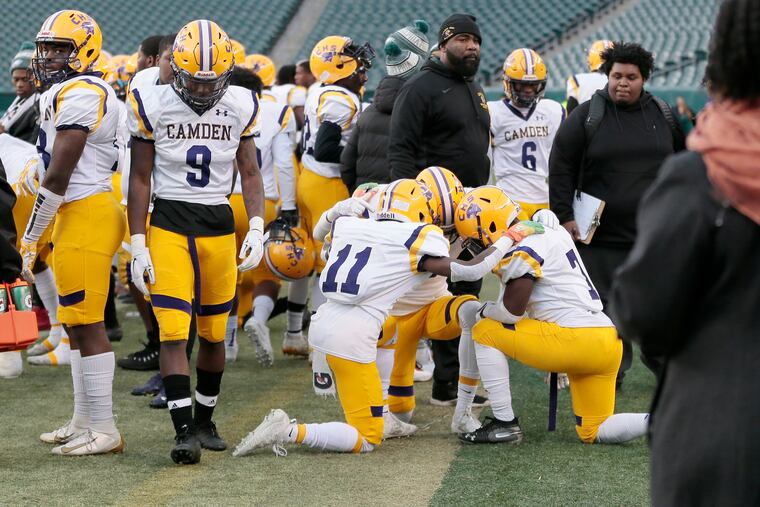Eagles’ noble gesture can’t heal wounds of Micah Tennant’s death and Camden-Pleasantville shooting | Mike Sielski
The pomp and excitement of playing a high school football game at Lincoln Financial Field were at odds with the reason for playing the game there: the shooting death of a 10-year-old boy.

Everyone had left the field. Doug Pederson and Carson Wentz and Malcolm Jenkins and a dozen other Eagles players had returned to the NovaCare Complex to prepare for their game Sunday against the Seattle Seahawks. The Camden High School Panthers and the Pleasantville High School Greyhounds, having shared handshakes and bro hugs and snapped photos with their football heroes, had returned to the locker rooms at Lincoln Financial Field. Seven miles away, less than six hours earlier, Micah Tennant, 10, had died at Cooper University Hospital in Camden, from a bullet meant for someone else.
Now it was just after 4 p.m. Wednesday, sunlight starting to dim, wind picking up, and the pyrotechnics began. Smoke and steam shot from dispensers lined up outside two stadium tunnels. Over the loudspeakers, as the players and coaches charged back onto the field, Brian Johnson’s voice and Angus Young’s guitar blasted out a salute to those about to rock. Cheerleaders kicked and danced. The several hundred spectators – parents and school administrators and faculty who had been permitted to attend – stood and clapped and yelled, their cheers echoing.
Five days earlier, gunshots in the stands at Pleasantville High, fired in an apparent retaliatory shooting, had stopped a state playoff game between these two teams, with Camden leading 6-0 in the third quarter. The shots had injured two people, and one of them had killed Micah Tennant, and now the teams were lined up at midfield in silence after the pomp and excitement, and a public-address announcer said, “Acts of violence do not win.”
It was all so discordant. The Eagles had made a noble gesture, offering the teams the opportunity to continue the game at Lincoln Financial Field at no cost to either the schools or the New Jersey State Interscholastic Athletic Association. But was it appropriate? Was it necessary? What did it accomplish? It felt strange, a half measure.
What had been lost that night was something intangible – the sense of community and camaraderie and safety that a Friday night at a football game can cultivate, the unspoken assurance that an atrocity such as the murder of a 10-year-old boy can’t and won’t happen here. An evil act had punctured that protective shell. No matter how many times a high school football player’s face flashes across the videoboard at an NFL stadium, what was lost that night can’t be recovered.
» READ MORE: Defendant who fled scene of deadly Pleasantville High School football shooting held for trial
“To play here was really exciting,” said Darian Chestnut, Camden’s starting quarterback, who ran for a touchdown in his team’s 22-0 victory. “But it wasn’t a good reason to play here.”
The Panthers, during their bus ride to Lincoln Financial Field, had stopped outside Cooper to hold a moment of silence for Micah. They did not learn of his death until the stadium’s PA announcer acknowledged it before the game. At Pleasantville, the football team’s players had gathered in an auditorium before lunch, and Chris Sacco, the Greyhounds’ head coach, told them. Some of the boys screamed. Some cried. One, junior Ernest Howard, walked outside and spent 15 minutes on the football field, just staring. Then he decided to switch his jersey from No. 2 to No. 10, because Micah was 10 years old.
“It was definitely a tough day,” Sacco said. “You’re down 6-0, and you’re in a state semifinal game, and you want to win. And on the other hand, it’s like, ‘Should we really even be here?’ ”
It was impossible not to ask that question through the sadness. There was anger, too, and there should have been.
» READ MORE: Hours after 10-year-old victim dies, South Jersey teams play at the Linc to finish game interrupted by shooting
“I really can’t speak about it because negative words might come out of my mouth,” Camden coach Dwayne Savage said. “It’s very disappointing for that to happen. We always preach to our guys that that’s our safe haven. We forget about all of our problems in between the white lines.”
What Savage was saying, in so many words, was that Alvin Wyatt – the alleged shooter – had violated a longstanding code: that there are sanctuaries away from and outside of the world in which Wyatt lives, that there are lines that those who live in that world with him know they are not supposed to cross. A football field is supposed to be one of those sanctuaries.
“In our city, it is,” Savage said. “Sports are off limits for anything in our city.”
“Football is supposed to be our way out from the streets and all that violence,” Chestnut said. “For that to happen at a game is unbelievable.”
But it had, and someone had decided to make it happen. It’s easy to fall back into the language that shrouds the reality of incidents like this, to rely on the personification and passive voice that we use as shorthand in these situations. We call it gun violence, as if it’s some mysterious, implacable force. No, a man had planned to shoot someone at a high school football game, to breach what was supposed to be an unbreakable barrier, and he did, and now Micah Tennant was dead.
Nothing changes that truth. Nothing heals that wound. The game didn’t need the smoke flares or the AC/DC intros or even the handshakes and selfies with the famous football players beforehand. All it needed was what it didn’t have before. All it needed was 100 yards, two teams, and the people who care about them -- all of them gathered together, in a safe place.